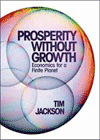Bare Necessities: How Much Household Carbon Do We Really Need?
Overall aims
Do substantial reductions in carbon emissions necessarily lead to lower social well-being? This project explored the minimum amount of household carbon required for a ‘decent’ life in the UK.
Context
While the consumption patterns of Western nations are generally deemed to be unsustainable, there is currently little attempt to restrain either material throughput or income growth. Nonetheless, in the face of the need to make ‘deep’ cuts in carbon emissions (for instance), consumption restraint may be a perfectly legitimate response.
Research questions and methods
The key questions the study addressed were: can carbon emissions be reduced without jeopardising quality of life? If so, what might lifestyles look like? To answer these questions a Reduced Consumption Scenario for the UK was developed. It was constructed by assuming that all households achieve a specific ‘minimum income standard’ deemed to provide a decent life. This income standard is taken from a previous study for the Joseph Rowntree Foundation which drew up detailed expenditure budgets. These budgets include not only subsistence commodities such as food, warmth and shelter but also the means to participate effectively in society. The Surrey Environmental Lifestyle MApping (SELMA) framework was used to calculate the greenhouse gas (GHG) emissions required in the production and distribution of all goods and services purchased according to these budgets.
Results
The results show that average household GHG emissions in the UK would be 37% lower in the Reduced Consumption Scenario than they were in 2004.
The budgets indicate which normal UK household expenditures should be protected to preserve a decent life and which might be considered ‘unnecessary’ and could be eliminated. For example, everything in the budgets was considered to be ‘necessary’ whereas in the current consumer culture many goods are purchased but never used. Similarly, provision of goods which primarily serve the purpose of ‘positional goods’ or ‘status markers’ are excluded in the scenario. Hence carbon emissions that arise in the production and distribution of these goods are eliminated. Importantly, however, the means for socialising with friends and family are specifically provided within the budgets, as this is key facet of a decent life.
A further feature of the study is that although the expenditure baskets were not drawn up with environmental considerations in mind, many of the expenditures reduced or eliminated were those that have high energy intensity. For example, holidays were assumed to be taken in the UK, it was assumed that a car was not needed, and the heating requirements of households were low due to assumed high thermal efficiency of dwellings. These assumptions underline the importance of significant infrastructure investment.
Implications
The findings of the project suggest that responding to climate change need not jeopardise quality of life. The study highlights the argument that a shift towards a society less focused on status-driven consumerism is essential. Such a society would have to prioritise the task of providing capabilities for flourishing in less materialistic ways. It also identifies the need for substantial investment to reduce emissions from housing and transport.
Outputs
Druckman, A and T Jackson 2009. The bare necessities: how much household carbon do we really need? RESOLVE Working Paper Series 05-09. Guildford: University of Surrey.
Druckman, A and T Jackson 2010. The bare necessities: How much household carbon do we really need? Ecological Economics 69 (9):1794-1804.
Druckman, A and T Jackson 2010. Minimum needs, minimum carbon? Exploring the carbon footprint of minimum income diets. The Food Magazine. London, UK, The Food Commission.
Druckman, A, Y Hartfree, D Hirsch and K Perren 2011. Sustainable income standards: Towards a greener minimum? York: Joseph Rowntree Foundation. Read Summary here.
Druckman, A and T Jackson 2012. How much carbon do households really need? In H Herring. (Ed) Living in a low-carbon society in 2050, Palgrave Macmillan, Basingstoke, UK (in press).





